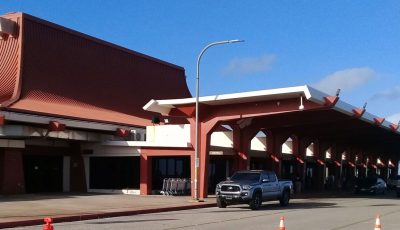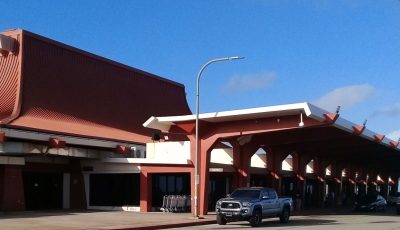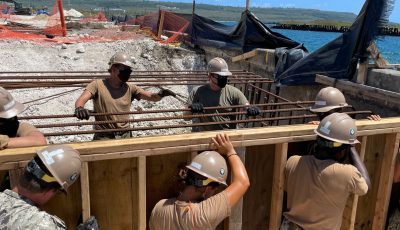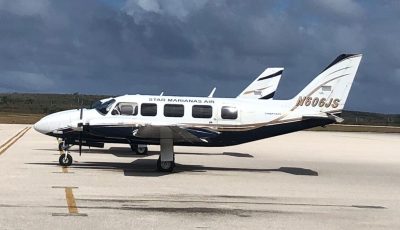SMA’s Christian: Audit shows CPA overcharged public over $2M

Christian
Star Marianas Air Inc. president Shaun Christian said the Commonwealth Ports Authority overcharged the traveling public, including those on Rota and Tinian, more than $2 million, based on an independent audit performed by Deloitte & Touche.
In a statement Wednesday, Christian said CPA has yet to provide proper notice to stop assessing Tinian and Rota customers.
Christian issued the statement after CPA board chair Kimberlyn King-Hinds recently stated that Star Marianas’ decision to increase in airfare from Saipan to Rota and Tinian is unacceptable because the company hasn’t made payments to CPA since 2015, and all CPA fees have been waived since June until December 2021.
Asked for comment yesterday, King-Hinds described this as a mischaracterization of the facts and is SMAI’s “modus operandi,” as it has been complaining about the PFC for many years.
She pointed out that SMAI first filed a complaint with the Federal Aviation Administration, saying it was a violation of the “anti-head tax.” That complaint was later dismissed, she said.
“Now they just call it an overcharge. Enough already!” she said.
According to the SMAI website, the fare for flights between Saipan and Tinian will increase to $60 from $55, while the fare between Saipan and Rota will increase to $135 from $125. The increase will take effect beginning this Sunday, Aug. 1.
Christian said that, despite King-Hinds’ comments about suspending those fees, the CPA accepted and deposited Passenger Facility Charges by Star Marianas on behalf of CPA for every month, including through June 30, 2021.
Christian pointed out that CPA has absolutely no aviation regulatory authority at all.
King-Hinds said SMAI is right—CPA does not have the authority to regulate fees. “They can charge whatever fare they want. But just because you can, doesn’t mean you should,” she said.
At a time when people are struggling and fees have been waived, it is unconscionable to raise fares, she said. “It’s a heartless move,” King-Hinds said.
Christian said aviation safety is the function of the Federal Aviation Administration and that the U.S. Department of Transportation has the responsibility for ensuring air carriers have proper management, sufficient economic backing, and have not been involved in regulatory non-compliance.
Christian said the Airline Deregulation Act of 1978 prohibits state and local governments, including the CPA, from regulating or interfering with the price, routes, or services of an air carrier.
“Even the DOT does not dictate to Star Marianas or any other air carrier what fares should be charged to its customers,” he said.
Therefore, Christian said, if the CPA is attempting to interfere with Star Marianas’ business decisions with regard to their pricing policies, it is clearly not within the scope or function of the CPA’s responsibilities and is contrary to federal law.
He said the purpose of a “Port Authority” is to ensure that the airports it is responsible for are maintained in compliance with 14 Code of Federal Regulations (CFR)139.
Christian said all air carriers that conduct scheduled passenger flights with aircraft using more than nine passenger seats must have airports that meet the requirements detailed in 14 CFR 139.
He said airport terminals, runways, instrument procedures, lighting, aircraft fire and rescue equipment, fencing and security are all detailed in 14 CRF 139 and that CPA is required to maintain the airports that have scheduled passenger service in compliance with FAA’s requirements.
The SMAI president said
In order to pay for meeting the requirements in 14 CFR 139, FAA provides grants to CPA under the authority of the Airport Improvement Act, Christian said. In certain cases, he said, CPA may be eligible to collect Passenger Facility Charges to pay for costs that exceed the amounts provided by these grants.
He said the PFC program is administered under the rules in 14 CFR 158 and both the CPA and the FAA have certain responsibilities to ensure that the public is not overcharged under the PFC program.
Christian said Star Marianas does not operate aircraft with more than nine passenger seats and therefore it does not require any of the services the CPA is required to provide under its obligations to the FAA that are specified in 14 CFR 139.
He said the only relationship between Star Marianas and CPA is that Star Marianas is a tenant and CPA is the landlord. Christian said the tenant’s and landlord’s obligations are detailed in the Airport Use Agreement.
He said CPA’s continued disregard in meeting its requirements are currently being litigated by Star Marianas because CPA refuses to comply with its obligations in Section 7 of the AUA.
Christian said there are no provisions in the AUA that allow CPA to unilaterally charge fees or waive fees. He said there are also no provisions in 14 CFR 158 that allows CPA to unilaterally assess or waive PFCs.
However, he said, King-Hinds continues to demonstrate a lack of knowledge of CPA’s responsibilities and substantiates Star Marianas’ contentions that intervention is required by either judicial or federal authority to bring CPA into compliance. (Ferdie De La Torre)



























